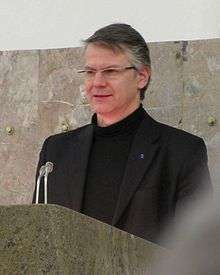Durs Grünbein

Durs Grünbein (born 9 October 1962, in Dresden) is a German poet and essayist living in Rome since 2013.
Life and career
Durs Grünbein studied theater in Berlin, where he lives as a freelance writer since 1987. He debuted in 1988 with a small book of poems, titled Grauzone morgens. In 1991 he published his second small book of poems, the Schädelbasislektion .[1] Grünbein has been awarded many German literary prizes, including the Georg-Büchner-Preis, which he won in 1995.[2] That same year, he also won the Peter Huchel Prize for Poetry.[3] In 2005, he held the position of Max Kade Distinguished Visiting Professor at Dartmouth College. Since 2006, Grünbein is a visiting professor at the academy of fine arts at Düsseldorf and at the European Graduate School in Saas-Fee. In 2009 he was a poet in residence at the Villa Massimo in Rome.[4] Grünbein is a regular contributor to Frau und Hund - Zeitschrift für kursives Denken, edited by the academy's rector, the painter Markus Lüpertz. Grünbein has also published several essay collections and new translations of plays from antiquity, among them Aeschylus' The Persians, and Seneca's Thyestes. Some of his works, which also includes contributions to catalogues and a libretto for opera, have been translated into several languages.
Bibliography
Poetry
- Grauzone morgens (1988), ISBN 3-518-13330-6
- Schädelbasislektion (1991), ISBN 3-518-40375-3
- Falten und Fallen (1994), ISBN 3-518-40570-5
- Den teuren Toten (1994), ISBN 3-518-40629-9
- Strophen für Übermorgen, ISBN 3-518-41908-0
- Nach den Satiren (1999), ISBN 3-518-41028-8
- Erklärte Nacht (2002), ISBN 3-518-41305-8
- Vom Schnee (2003), ISBN 3-518-41455-0
- Der Misanthrop auf Capri (2005), ISBN 3-518-22394-1
- Porzellan. Poem vom Untergang meiner Stadt (2005), ISBN 3-518-41722-3
- Aroma (2010), ISBN 9783518421673
- Koloss im Nebel (2012 ), ISBN 9783518423165
Articles, essays
- Galilei vermisst Dantes Hölle und bleibt an den Maßen hängen. Aufsätze 1989-1995 (1996), ISBN 3-518-40758-9
- Das erste Jahr. Berliner Aufzeichnungen (2001), ISBN 3-518-41277-9
- Warum schriftlos leben. Aufsätze (2003), ISBN 3-518-12435-8
- Antike Dispositionen (2005),
- Die Bars von Atlantis. Eine Erkundigung in vierzehn Tauchgängen (2009), ISBN 3-518-12598-2
- Cyrano oder Die Rückkehr vom Mond (2014), ISBN 9783518424155
Books in English translation
- Ashes for Breakfast: Selected Poems, (translated in 2005 by Michael Hofmann) (shortlisted for the 2006 International Griffin Poetry Prize)
- Descartes' Devil: Three Meditations (translated by Anthea Bell; published by Upper West Side Philosophers, Inc., New York, 2010)
- The Bars of Atlantis: Selected Essays. New York: Farrar, Straus and Giroux, 2010
Critical reception
After the opening of the Wall and the reunification of both states of Germany, there was an increased interest, to publish young writers from former East Germany. This tolerant trend came in useful for Durs Grünbein. He received critical respect for his Schädelbasislektion (Scull base lecture), a poetry book with strong and with weak and bad verses,[5] as the literary critic adjugded. The poems are talking about how someone can manage not to become insane in the locked country[6] The best of them succeeding this motif with a specious intensity, the bad ones are full of empty statements" because of the author’s compulsion for French theorists of simulation,as the critic early on warned.[7] Initially welcomed by the German publicist Frank Schirrmacher as the first genuine voice of the new republik,[8] the same one later declared a lot of Grünbein’s poetry as mere clichés of clichés. [9] Even former admirers—e.g. as the critic Ernst Osterkamp—changed their standpoint little by little into a harsher position. Thus Grünbein’s poetry book "Aroma" was criticized by Osterkamp as an "highfaluting talk of Roman trivialities and banalities with stilted little finger, as if it were precious items".[10] Therefore, Fritz. J. Raddatz, one of the most influential literary critic, designated that Grünbein succeed sometimes quite remarkable poems but not an acceptable poetic work, and called out the poet himself as versifying washout,[11] who squanders his given talent.
Further reading
- Michael Eskin/Karen Leeder/Christopher Young (eds.): Durs Grünbein. A Companion. Berlin/Boston: De Gruyter 2013. ISBN 978-3-11-022794-9
- Fritz J. Raddatz: Durs Grünbein – die dichtende Luftnummer. In: Die Welt, 21. 08. 2012 http://www.welt.de/kultur/literarischewelt/article108711083/Durs-Gruenbein-die-dichtende-Luftnummer.html
See also
References
- ↑ https://www.perlentaucher.de/autor/durs-gruenbein.html
- ↑ Büchner Preis List of Recipients. Retrieved May 15, 2010.
- ↑ Peter Huchel Preis. Introduction and Recipients. Retrieved May 15, 2010.
- ↑ Profile at Villa Massimo in Rome. Retrieved May 15, 2010.
- ↑ Cf. FAZ 28. 03. 1992. BuZ, p. 5.
- ↑ Cf. FAZ 28. 03. 1992. BuZ, p. 5.
- ↑ Cf. Frankfurter Allgemeine Zeitung 28. 03. 1992. BuZ, p. 5.
- ↑ Frankfurter Allgemeine Zeitung, 09. 05. 1995.
- ↑ Quoted after Fritz. J. Raddatz: Nicht Entwurf der Moderne, sondern Faltenwurf der Mode. (Not creation of modernity, but pleated fabric) in: Die Zeit, No. 39, 22.09.1995 http://www.zeit.de/1995/39/Nicht_Entwurf_der_Moderne_sondern_Faltenwurf_der_Mode/seite-2
- ↑ Cf. Ernst Osterkamp, Frankfurter Allgemeine Zeitung 22.10. 2010
- ↑ Cf. Fritz. J. Raddatz: Durs Grünbein — die dichtende Luftnummer. In: Die Welt 21. 08. 2012 http://www.welt.de/kultur/literarischewelt/article108711083/Durs-Gruenbein-die-dichtende-Luftnummer.html
External links
- Griffin Poetry Prize biography, including audio and video clips
- Profile on Germany - Poetry International Web site
- Durs Grünbein at the complete review
- Why Live Without Writing: Unpopular answers to poetry questions essay published in February 2010 at the Poetry Foundation website